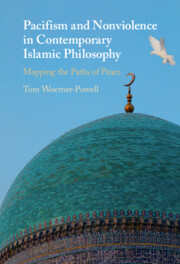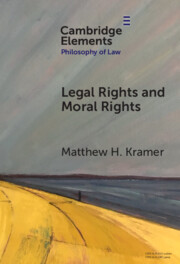573 results
Introduction
-
- Book:
- The Individual in the Law and Practice of the International Court of Justice
- Published online:
- 25 March 2025
- Print publication:
- 30 April 2025, pp 1-12
-
- Chapter
- Export citation
1 - What Is the Problem with Price Personalization?
- from Part I - Understanding the Phenomenon
-
-
- Book:
- The Cambridge Handbook of Algorithmic Price Personalization and the Law
- Published online:
- 20 March 2025
- Print publication:
- 27 March 2025, pp 29-49
-
- Chapter
- Export citation
Justice in the Time of Cholera
-
- Journal:
- Asia-Pacific Journal / Volume 22 / Issue 3 / March 2024
- Published online by Cambridge University Press:
- 14 March 2025, e3
-
- Article
-
- You have access
- Export citation

Pacifism and Non-Violence in Contemporary Islamic Philosophy
- Mapping the Paths of Peace
-
- Published online:
- 13 March 2025
- Print publication:
- 20 March 2025
-
- Book
-
- You have access
- Open access
- Export citation
Socioeconomic Inequalities in Hegelian Market Society and Hegel’s Theory of Justice
-
- Journal:
- Journal of the American Philosophical Association , First View
- Published online by Cambridge University Press:
- 10 March 2025, pp. 1-19
-
- Article
-
- You have access
- Open access
- HTML
- Export citation
The January 6th Insurrection and the Triggering of African Americans’ Racial Resentment
-
- Journal:
- Journal of Race, Ethnicity and Politics , First View
- Published online by Cambridge University Press:
- 21 February 2025, pp. 1-19
-
- Article
-
- You have access
- Open access
- HTML
- Export citation
4 - Fairness and Artificial Intelligence
- from Part I - AI, Ethics and Philosophy
-
-
- Book:
- The Cambridge Handbook of the Law, Ethics and Policy of Artificial Intelligence
- Published online:
- 06 February 2025
- Print publication:
- 13 February 2025, pp 79-100
-
- Chapter
-
- You have access
- Open access
- HTML
- Export citation
The Poisoning of the Rule of Law
-
- Journal:
- Canadian Journal of Law & Jurisprudence , First View
- Published online by Cambridge University Press:
- 10 February 2025, pp. 1-29
-
- Article
-
- You have access
- Open access
- HTML
- Export citation
11 - Owing God Worship
- from Part III - Normative Aspects
-
-
- Book:
- The Philosophy of Worship
- Published online:
- 09 January 2025
- Print publication:
- 23 January 2025, pp 189-208
-
- Chapter
- Export citation
Chapter 9 - Ethico-legal Considerations in Psychiatry
-
-
- Book:
- Fundamentals of Clinical Psychiatry
- Published online:
- 02 January 2025
- Print publication:
- 16 January 2025, pp 71-77
-
- Chapter
- Export citation
Glimpses of Hope: Reflections on Journeying with Survivors of Clergy Sexual Abuse
-
- Journal:
- Journal of Anglican Studies / Volume 22 / Issue 2 / November 2024
- Published online by Cambridge University Press:
- 13 January 2025, pp. 352-360
-
- Article
-
- You have access
- HTML
- Export citation
16 - Justice and Democracy in Migration
- from Part IV - Democratizing Shifting Borders
-
-
- Book:
- Lawless Zones, Rightless Subjects
- Published online:
- 02 January 2025
- Print publication:
- 09 January 2025, pp 280-296
-
- Chapter
-
- You have access
- Open access
- HTML
- Export citation
Chapter 8 - Freedom, Value, Justice
- from Part III - Conclusions and Applications
-
- Book:
- Reconceiving Freedom from the Shadows of Slavery
- Published online:
- 02 January 2025
- Print publication:
- 09 January 2025, pp 185-214
-
- Chapter
- Export citation
Introduction
-
- Book:
- Reconceiving Freedom from the Shadows of Slavery
- Published online:
- 02 January 2025
- Print publication:
- 09 January 2025, pp 1-18
-
- Chapter
- Export citation
Exploitation, Human Rights and Corporate Obligations
-
- Journal:
- Business and Human Rights Journal / Volume 9 / Issue 3 / October 2024
- Published online by Cambridge University Press:
- 06 January 2025, pp. 361-380
-
- Article
-
- You have access
- Open access
- HTML
- Export citation

Legal Rights and Moral Rights
-
- Published online:
- 02 January 2025
- Print publication:
- 16 January 2025
-
- Element
- Export citation
“The Public Practice of Humanity”: How Antislavery Writing Matters Now
- Part of
-
- Journal:
- Public Humanities / Volume 1 / 2025
- Published online by Cambridge University Press:
- 23 December 2024, e39
-
- Article
-
- You have access
- Open access
- HTML
- Export citation
Conclusion
-
- Book:
- The Quislings
- Published online:
- 12 December 2024
- Print publication:
- 19 December 2024, pp 298-304
-
- Chapter
- Export citation
Introduction
-
- Book:
- Shakespeare's Political Spirit
- Published online:
- 12 December 2024
- Print publication:
- 19 December 2024, pp 1-37
-
- Chapter
- Export citation
Chapter 3 - Coriolanus and the Work of Spirit
-
- Book:
- Shakespeare's Political Spirit
- Published online:
- 12 December 2024
- Print publication:
- 19 December 2024, pp 112-150
-
- Chapter
- Export citation


